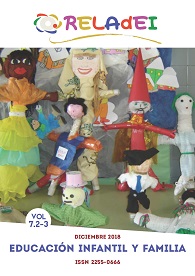Crescere “ad alto contatto”, tra nuove pratiche di parenting e insicurezze genitoriali: il ruolo dei servizi per l’infanzia
Contido principal do artigo
Resumo
Il presente contributo intende offrire una cornice riflessiva entro la quale comprendere nuove pratiche di parenting da considerare come spie delle trasformazioni in atto nei processi di interpretazione e “appropriazione” del ruolo genitoriale. Interpretazioni che possono essere assunte quali tentativi di rifondare il legame genitori-figli, tenendo conto delle pressioni a cui sono sottoposte le famiglie, delle novità provenienti dall’orizzonte globalizzato e multiculturale in cui viviamo, delle nuove tecnologie che veicolano e condizionano gli scambi comunicativi quotidiani.
In particolare verranno qui prese in considerazione alcune pratiche che caratterizzano la relazione tra genitori e figli piccoli in un numero crescente di famiglie: l’allattamento a richiesta, l’autosvezzamento, il co-sleeping, il babywearing, che hanno dirette implicazioni sul piano educativo e sulla creazione del legame originario. Si tratta di comportamenti che stanno a margine dei servizi per l’infanzia, che non vi entrano e che perciò non sono, in genere, oggetto di riflessione specifica. E tuttavia possono riferire di vissuti e nuovi fermenti relazionali tra le nuove generazioni di genitori.
Poiché le pratiche di cura dei servizi per la prima infanzia si innestano su quelle genitoriali, provare a riflettere sul significato di questi comportamenti non generalizzabili ma comunque sempre più diffusi può schiudere nuove prospettive di riconoscimento, spazi di comprensione reciproca e di collaborazione tra famiglie e servizi per l’infanzia, estendendo così gli ambiti di interazione e rendendo maggiormente permeabile quel confine tra pubblico e privato che nell’irrigidimento crea distanze e mutue esclusioni.


